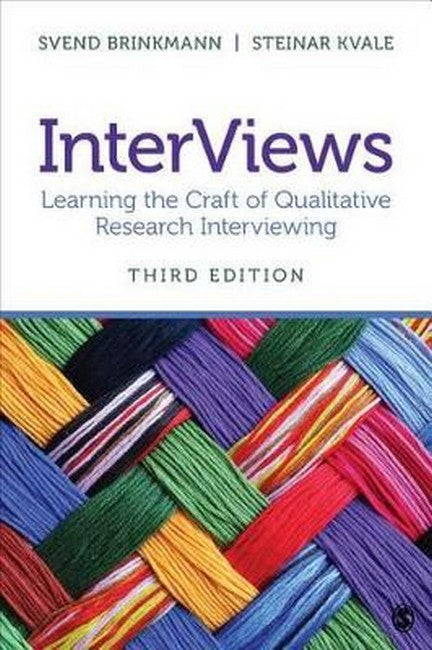List of Boxes, Figures, and Tables Preface to the Third Edition Acknowledgments About the Author Introduction 1. Introduction to Interview Research Conversation as Research Three Interview Sequences Interview Research in History and in the Social Sciences The Interview Society Methodological and Ethical Issues in Research Interviewing Overview of the Book Interviewing as a Craft Interviewing as a Social Production of Knowledge Interviewing as a Social Practice Part I: Conceptualizing the Research Interview Part II: Seven Stages of Research Interviewing Concluding Perspectives PART I. Conceptualizing the Research Interview 2. Characterizing Qualitative Research Interviews A Qualitative Research Interview on Learning Phenomenology and the Mode of Understanding in a Qualitative Research Interview Power Asymmetry in Qualitative Research Interviews Philosophical Dialogues, Therapeutic Conversations, and Research Interviews Therapeutic Interviews and Research Interviews Qualitative Interviews as Research Instruments and Social Practices 3. Epistemological Issues of Interviewing The Interviewer as a Miner or as a Traveler Interviews in a Postmodern Age Seven Features of Interview Knowledge Knowledge and Interviews in a Positivist Conception A Rehabilitation of Classical Positivism? Methodological Positivism Qualitative Interviewing Between Method and Craft Research Interviewing: Method or Personal Skills The Craft of Research Interviewing Learning the Craft of Research Interviewing 4. Ethical Issues of Interviewing Interviewing as a Moral Inquiry Ethical Issues Throughout an Interview Inquiry Ethical Positions: Rules and Procedures or Personal Virtues? Ethical Guidelines Informed Consent Confidentiality Consequences The Role of the Researcher Learning Ethical Research Behavior 5. The Qualitative Research Interview as Context Interviewers and Interviewees The Interviewer The Interviewee Bodies and Nonhumans Nonhumans and Surroundings PART II. Seven Stages of an Interview Investigation 6. Thematizing and Designing an Interview Study Seven Stages of an Interview Inquiry Thematizing an Interview Study Designing an Interview Study Mixed Methods 7. Conducting an Interview A Class Interview About Grades Setting the Interview Stage Scripting the Interview Interviewer Questions The Art of Second Questions 8. Interview Variations Interview Subjects Interviewing Subjects Across Cultures Interviews With Children Interviews With Elites Interview Forms Computer-Assisted Interviews Focus Group Interviews Factual Interviews Conceptual Interviews Narrative Interviews Discursive Interviews Confrontational Interviews 9. Interview Quality Hamlet's Interview Interview Quality The Interview Subject Interviewer Qualifications Standard Objections to the Quality of Interview Research Leading Questions 10. Transcribing Interviews Oral and Written Language Recording Interviews Transcribing Interviews Transcription Reliability, Validity, and Ethics 11. Preparing for Interview Analysis The 1,000-Page Question A Method of Analyzing the Question? Steps and Modes of Interview Analysis Computer Tools for Interview Analysis Coding 12. Interview Analyses Focusing on Meaning Meaning Condensation Meaning Interpretation The Issue of Multiple Interpretations Hermeneutical Interpretation of Meaning The Primacy of the Question in Interpretation Analytic Questions Posed to an Interview Text The Quest for the "Real Meaning" 13. Interview Analyses Focusing on Language Linguistic Analysis Conversation Analysis Narrative Analysis Discourse Analysis Deconstruction 14. Eclectic and Theoretical Analyses of Interviews Interview Analysis as Bricolage Interview Analysis as Theoretical Reading 15. The Social Construction of Validity Objectivity of Interview Knowledge Reliability and Validity of Interview Knowledge Validity as Quality of Craftsmanship Communicative Validity Pragmatic Validity Generalizing From Interview Studies 16. Reporting Interview Knowledge Contrasting Audiences for Interview Reports Boring Interview Reports Ethics of Reporting Investigating With the Final Report in Mind Standard Reports and Ways of Enhancing Them Method Results Enriching Interview Reports Journalistic Interviews Dialogues Therapeutic Case Histories Narratives Metaphors Visualizing Collage Publishing Qualitative Research 17. Conversations about Interviews Critiques of the Quality of Interview Knowledge Developing the Craft of Research Interviewing An Epistemology of Interview Knowledge The Object Determines the Method The Social Science Dogma of Quantification Research Interviewing as Social Practice Research Interviewing in a Social Context Interview Ethics in a Social Context Appendix: Learning Tasks Glossary References Index
Request Academic Copy
Please copy the ISBN for submitting review copy form
Description
"I greatly value [this book] because [it] articulates the philosophical and methodological approach to validity in qualitative interview research like no other text . . . We consider it our qualitative interview method bible." -- Jean Richey, University of Alaska Fairbanks "The text is well organized and I am always amazed that Kvale and Brinkmann do have an answer to anything that has to do with interviewing." -- Astrid Eich-Krohm, Southern CT State University "Kvale and Brinkman's text is well organized, clearly written, and introduces readers to the world of qualitative interview research. The authors guide readers thinking conceptually as well as practically to design and implement interview studies with clearly articulated concepts and discussions . . . The book has good, in-depth coverage with the kind of theoretical grounding we emphasize in our qualitative research program." -- Kathleen deMarrais, University of Georgia "The text is well written and the guidelines provided are easy to use. This book is of immense value to researchers and academics, as well as to students. [It] provides practical insight into the interview process [and] provides rich information on the planning, executing and analysis of interviews." -- Dr. Asma Rauf, Essex Business School, University of Essex, Essex, UK "The text is beautifully organized. The third edition builds upon the strengths of the first two, in which the authors balance the apparent paradox between learning interviewing as a "craft" . . . and learning from a textbook . . . There are no comparable books to this one! In the preface Brinkman writes, 'I hope to have struck a balance between a respect for well proven practices of the craft of interviewing on the one hand and innovations, and provocations even, on the other.' He has." -- Jon Wergin, Antioch University "This text provides a deep dive on qualitative interviewing, missing from many works on qualitative research. [It] is useful in that it situates interviews paradigmatically while also providing an historical treatment of interviews across disciplines. The text is well organized and approachable for novices and experts seeking richer understandings of interviewing." -- Jeannine Dingus-Eason, St. John Fisher College

